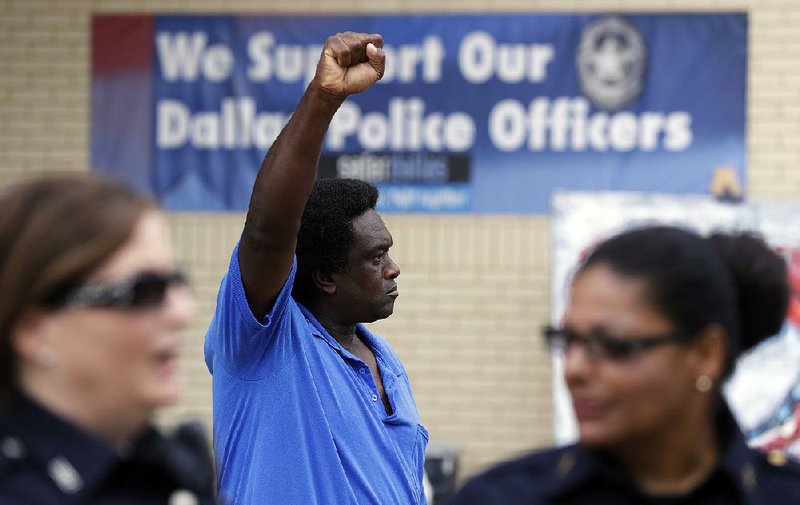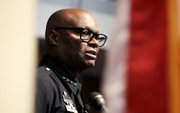DALLAS -- Military service changed the Dallas gunman from an extrovert into a hermit, his parents said in an interview excerpt published Monday, as the investigation into the attack continued.
Micah Johnson's mother, Delphine Johnson, told TheBlaze website in an interview that her son wanted to be a police officer as a child. His six years in the Army Reserve, including a tour in Afghanistan, were "not what Micah thought it would be ... what he thought the military represented, it just didn't live up to his expectations." According to the military lawyer who represented him, Johnson was accused of sexually harassing a female soldier while deployed.
His father, James Johnson, said through tears: "I don't know what to say to anybody to make anything better. I didn't see it coming."
The black 25-year-old fatally shot five officers in Thursday's attack while hundreds of people were gathered in downtown Dallas to protest recent fatal police shootings, and he wounded at least nine officers and two civilians.
Dallas Police Chief David Brown clarified Monday where Johnson was killed with a bomb delivered by a remote-controlled robot, saying that it happened on the second floor of El Centro College, not a parking garage as authorities previously described. Two officers from El Centro were injured. Brown did not provide more details, including the locations of the negotiations that came before the bomb.
The police chief again defended the decision to use the robot, saying he had "already killed us in a grave way, and officers were in surgery that didn't make it."
"This wasn't an ethical dilemma for me," Brown said. "I'd do it again ... to save our officers' lives."
Authorities have said Johnson had plans for a larger assault, possessed enough explosive material to inflict far greater harm and kept a journal of combat tactics. Eleven officers fired at Johnson and two used an explosive device, Brown said, adding that the investigation will involve more than 170 hours of body camera footage and "countless hours" of dashcam video.
Brown added that he feels that law enforcement officers across the country are being asked to take on too much.
"We're asking cops to do too much in this country," Brown said. "We are. Every societal failure, we put it off on the cops to solve. Not enough mental health funding, let the cops handle it. Here in Dallas we got a loose dog problem; let's have the cops chase loose dogs. Schools fail, let's give it to the cops. That's too much to ask. Policing was never meant to solve all those problems."
Johnson's time in the Army was marked by a sexual harassment accusation in May 2014 while in Afghanistan. The Army sent him stateside, recommending an "other than honorable discharge" -- which is "highly unusual" because counseling is usually ordered before more drastic steps are taken, said Bradford Glendening, the military lawyer who represented him.
"In his case, it was apparently so egregious, it was not just the act itself," Glendening said. "I'm sure that this guy was the black sheep of his unit."
Protests across country
The Dallas attack began during protests over the police killings of Philando Castile, who was fatally shot near St. Paul, Minn., and Alton Sterling, who was shot in Baton Rouge after being pinned to the pavement by two white officers. Video from Dallas showed protesters marching along a downtown street about half a mile from City Hall when shots started and the crowd scattered, seeking cover.
Brown's calls for change Monday followed demonstrations late Sunday in cities including Memphis, Atlanta and Baton Rouge. The Louisiana capital has been the scene of intense showdowns between protesters and heavily armed riot police.
In St. Paul, City Attorney Samuel Clark said Monday that he has decided to charge all 46 adults arrested in a weekend protest on Interstate 94 with third-degree riot, a gross misdemeanor.
In Memphis on Monday, leaders of the Black Lives Matter movement delivered to city officials a list of changes they want to see take place to improve the lives of black residents in the majority black city.
Minister Devante Hill, an organizer of a protest that blocked Interstate 40 on Sunday night, listed the group's demands during a community meeting with Mayor Jim Strickland and interim Police Director Michael Rallings at a church. The gathering drew more than 1,200 people.
Topping the list was for Strickland to hire Rallings, who is black, on a permanent basis. Members of Black Lives Matter who spoke at the meeting praised Rallings and the Police Department for helping keep the peace during tense and confrontational moments on the bridge.
In Atlanta, Mayor Kasim Reed said Monday that police showed "extraordinary restraint" during four straight nights of protests and urged protesters to show respect to law enforcement officers as demonstrations continue.
Reed said about 15,000 people attended various protests over the weekend, and 14 people were arrested Saturday and Sunday by the Atlanta Police Department. Two others were arrested by the Georgia State Patrol.
Demonstrators blocked the road in front of a mall in the Buckhead neighborhood Monday evening before marching to the governor's mansion, where they were staging a sit-in. Area media outlets reported that hundreds of protesters gathered Monday evening and that several were arrested as they marched in the streets.
In Baton Rouge, criticism mounted Monday over how police dealt with throngs of protesters during the weekend, including nearly 200 demonstrators who were arrested.
The American Civil Liberties Union of Louisiana said Monday that Baton Rouge police "used violent, militarized tactics on groups of people who have gathered peacefully in protest of Alton Sterling's killing."
Louisiana authorities have said repeatedly that they have no problem with protesters and pointed out the number of rallies that have been coordinated with authorities and have gone off without problems.
Abdullah Muflahi, the owner of the convenience store where Sterling was shot, filed a lawsuit Monday against Baton Rouge police alleging that he was illegally detained after he recorded the confrontation between police and Sterling on his cellphone. The suit says he was kept in the back of a police vehicle for four hours and detained at the Louisiana State Police headquarters for two hours while he was questioned.
He also alleges that police illegally seized his store's surveillance video equipment without a warrant and that officers illegally seized his cellphone and did not allow him to call his family or lawyer.
Baton Rouge police allege in a search warrant filed in state court Monday that Sterling refused to place his hands on the hood of a vehicle and that the officers saw a "butt of a gun" in his front pocket.
An affidavit filed with the warrant provides officers' most detailed account yet of what happened in the deadly altercation. It says the officers gave Sterling "direct orders to place his hands on the hood of a nearby vehicle." The warrant says Sterling did not obey the order and resisted arrest, at which point the officers "deployed their BRPD issued Tasers." During the arrest, the warrant says, the officers saw "the butt of a gun" in Sterling's pocket and that he tried "to reach for the gun from his pocket."
Also Monday, funeral services for Sterling were announced. Services will be held Friday in Baton Rouge at the Southern University F.G. Clark Activity Center.
Memorial for officers
More than 1,000 people gathered in downtown Dallas to attend a candlelight vigil Monday night for the five police officers killed there.
Speakers at the vigil included police officials and friends of the slain officers. Portraits of the officers were propped up in front of the speaker's platform.
A memorial service is planned today for the officers, with President Barack Obama, Vice President Joe Biden and former President George W. Bush and his wife, Laura, planning to attend.
Obama is due to deliver remarks at the interfaith memorial service and is expected to meet with victims' families and with local law enforcement officials mourning their own.
On Monday, Obama met with law enforcement officials to discuss implementing a set of police changes drafted by a White House task force, and he'll meet Wednesday with a broader group, including law enforcement officials, activists and academics.
Texas Gov. Greg Abbott announced Monday that he will not be able to make it because he'll be undergoing skin grafts on his feet after suffering second- and third-degree burns on his feet and both legs below the knees. Abbott spokesman Matt Hirsch said the governor scalded himself with hot water, but he declined to provide further details. Abbott's wife, Cecilia Abbott, will take his place.
Police on Monday released information on the funerals for four of the officers.
The funeral for Brent Thompson, an officer with the Dallas Area Rapid Transit authority, will be held Wednesday afternoon at Northside Baptist Church in Corsicana, Texas.
Services for Dallas police Senior Cpl. Lorne Ahrens will be held Wednesday at Prestonwood Baptist Church in the Dallas suburb of Plano.
A funeral will be held Wednesday for Dallas police Sgt. Michael Smith at Mary Immaculate Catholic Church in Farmers Branch.
The Fort Worth Independent School District said the funeral for Dallas police officer Patrick Zamarripa will be held Saturday at the district's Wilkerson-Greines Activity Center.
Information for this article was contributed by Nomaan Merchant, Kathleen Hennessey, Adrian Sainz, Kathleen Foody, Rebecca Santana, Michael Kunzelman, Janet McConnaughey and Will Weissert of The Associated Press; and by Brady Dennis, Mark Berman, Matt Zapotosky and Camille Pendley of The Washington Post.
A Section on 07/12/2016

